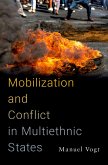Would the Islamic State ever renounce violence? In the current political climate, the question seems preposterous. Yet, at the height of a terrorist campaign against tourists in Egypt during the 1990s, nobody expected that the group behind the attacks would issue and adhere to a nonviolence initiative. What drives groups to shift between nonviolence and violence? When do opposition groups move away from armed action, and why do some organizations renounce violence permanently, whereas others refrain temporarily? In
The Violence Pendulum, Ioana Emy Matesan offers a theory of tactical change that explains both escalation and de-escalation in order to answer these questions. Matesan's analysis traces the historical evolution of four Islamist groups: the Muslim Brotherhood and al-Gama'a al-Islamiyya in Egypt, and Darul Islam and Jemaah Islamiyah in Indonesia. Drawing from archival materials, interviews, and reports, she focuses on turning points in each organization. Ultimately, she finds that Islamist groups alter their tactics in response to the perceived need for activism, shifts in the cost of violent versus nonviolent resistance, and internal or external pressures on the organization. Groups turn to violence when grievances escalate, violent resistance is feasible and publicly tolerated, and there are internal or external pressures to act. In turn, groups renounce armed action when violence costs them too much, disillusionment eclipses the perceived need for continued activism, and leaders are willing to rethink the tactics and strategies of the group. By uncovering the reasons for escalation and de-escalation across a range of political environments,
The Violence Pendulum reshapes our understanding of how decisions are made--and how nonviolence can be achieved--in armed groups.
Dieser Download kann aus rechtlichen Gründen nur mit Rechnungsadresse in A, B, BG, CY, CZ, D, DK, EW, E, FIN, F, GR, HR, H, IRL, I, LT, L, LR, M, NL, PL, P, R, S, SLO, SK ausgeliefert werden.









